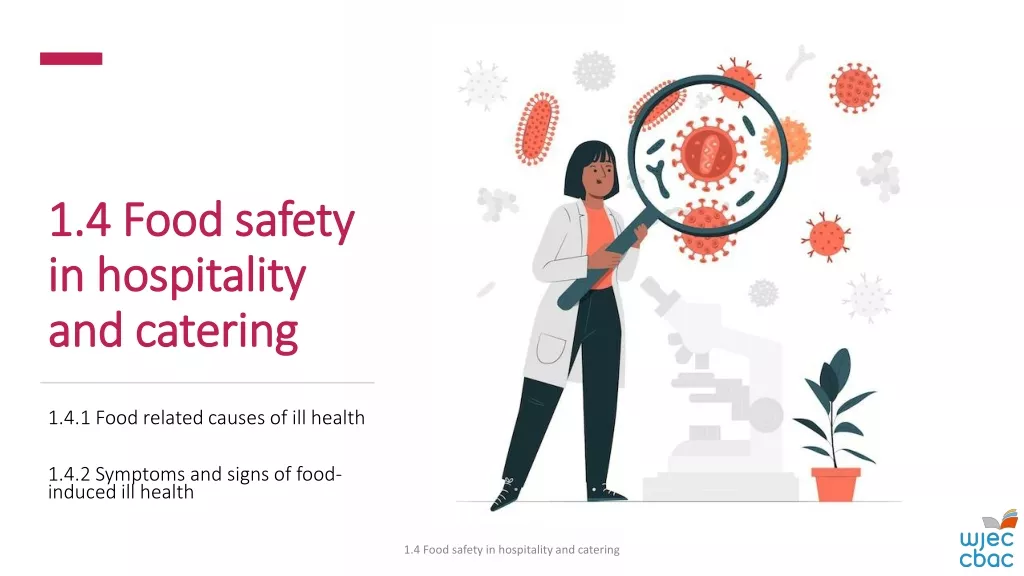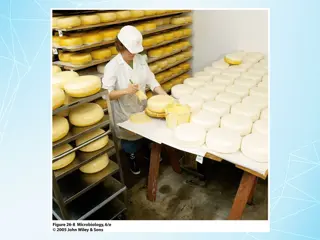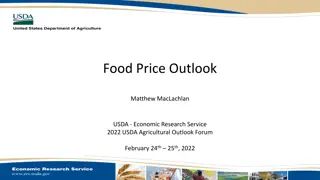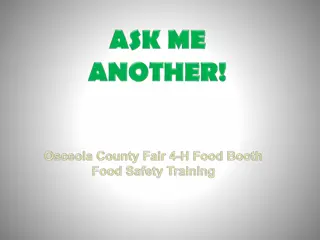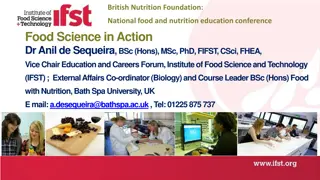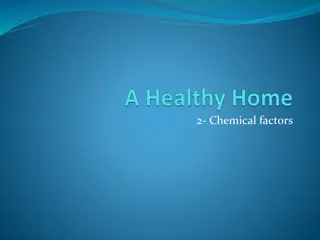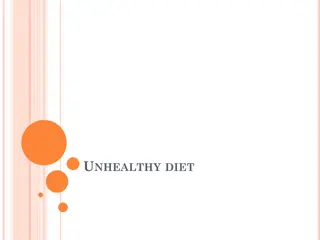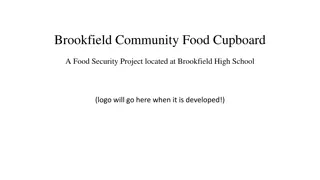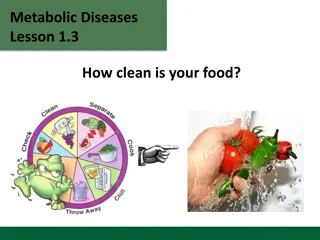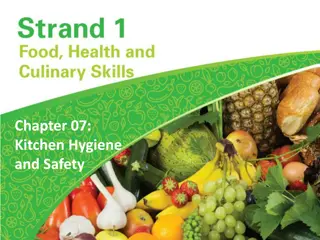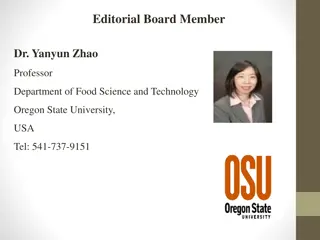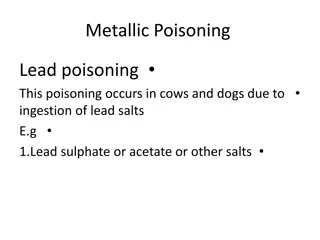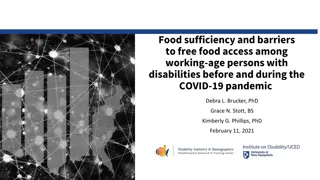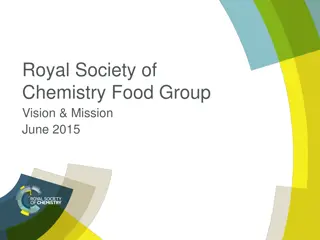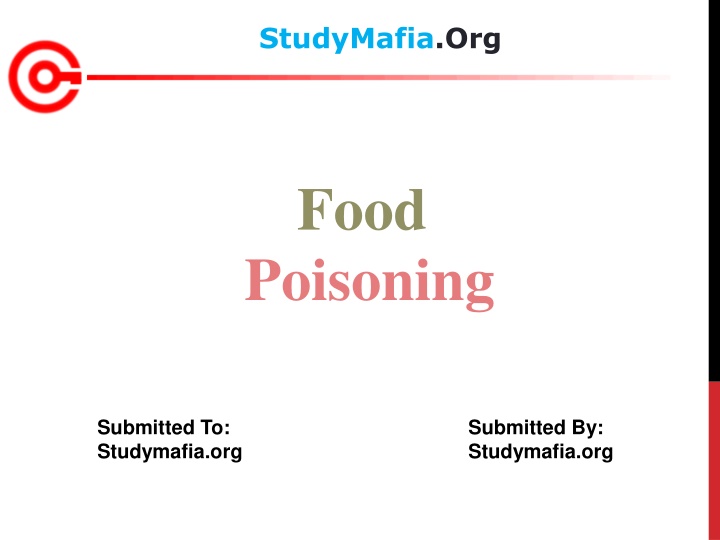
Food Poisoning: Causes, Symptoms, and Prevention
Learn about food poisoning, an illness caused by consuming contaminated food. Discover the symptoms, causes, risk factors, complications, prevention methods, and treatment options for food poisoning. Stay informed to protect yourself and your loved ones from this common health issue.
Download Presentation

Please find below an Image/Link to download the presentation.
The content on the website is provided AS IS for your information and personal use only. It may not be sold, licensed, or shared on other websites without obtaining consent from the author. If you encounter any issues during the download, it is possible that the publisher has removed the file from their server.
You are allowed to download the files provided on this website for personal or commercial use, subject to the condition that they are used lawfully. All files are the property of their respective owners.
The content on the website is provided AS IS for your information and personal use only. It may not be sold, licensed, or shared on other websites without obtaining consent from the author.
E N D
Presentation Transcript
StudyMafia.Org Food Poisoning Submitted To: Studymafia.org Studymafia.org Submitted By:
Table Contents Definition Introduction Symptoms of Food poisoning Causes of Food poisoning Risk-Factors of Food poisoning Complications of Food poisoning Prevention of Food poisoning Treatment of Food poisoning Conclusion 2
Definition Food poisoning, also called food-borne illness, is illness caused by eating contaminated food. Infectious organisms including bacteria, viruses and parasites or their toxins are the most common causes of food poisoning 3
Introduction Infectious organisms or their toxins can contaminate food at any point of processing or production. Contamination can also occur at home if food is incorrectly handled or cooked. Food poisoning symptoms, which can start within hours of eating contaminated food, often include nausea, vomiting or diarrhea. Most often, food poisoning is mild and resolves without treatment. But some people need to go to the hospital. 4
Causes of Food poisoning Contamination of food can happen at any point of production: growing, harvesting, processing, storing, shipping or preparing. Cross-contamination the transfer of harmful organisms from one surface to another is often the cause. This is especially troublesome for raw, ready-to-eat foods, such as salads or other produce. Because these foods aren't cooked, harmful organisms aren't destroyed before eating and can cause food poisoning. 6
Risk factors of Food poisoning Older adults. As you get older, your immune system may not respond as quickly and as effectively to infectious organisms as when you were younger. Pregnant women. During pregnancy, changes in metabolism and circulation may increase the risk of food poisoning. Your reaction may be more severe during pregnancy. Rarely, your baby may get sick, too. 10
Risk factors of Food poisoning Infants and young children. Their immune systems haven't fully developed. People with chronic disease. Having a chronic condition such as diabetes, liver disease or AIDS or receiving chemotherapy or radiation therapy for cancer reduces your immune response. 11
Complicationsof Food poisoning Listeria infection: Complications of a listeria food poisoning may be most severe for an unborn baby. Early in pregnancy, a listeria infection may lead to miscarriage. Later in pregnancy, a listeria infection may lead to stillbirth, premature birth or a potentially fatal infection in the baby after birth even if the mother was only mildly ill. 12
Complicationsof Food poisoning Escherichia coli (E. coli): Certain E. coli strains can cause a serious complication called hemolytic uremic syndrome. This syndrome damages the lining of the tiny blood vessels in the kidneys, sometimes leading to kidney failure. Older adults, children younger than 5 and people with weakened immune systems have a higher risk of developing this complication. 13
Prevention of Food poisoning Wash your hands, utensils and food surfaces often. Wash your hands well with warm, soapy water before and after handling or preparing food. Use hot, soapy water to wash utensils, cutting boards and other surfaces you use. Keep raw foods separate from ready-to-eat foods. When shopping, preparing food or storing food, keep raw meat, poultry, fish and shellfish away from other foods. This prevents cross-contamination. 14
Prevention of Food poisoning Cook foods to a safe temperature. The best way to tell if foods are cooked to a safe temperature is to use a food thermometer. You can kill harmful organisms in most foods by cooking them to the right temperature. Refrigerate or freeze perishable foods promptly within two hours of purchasing or preparing them. If the room temperature is above 90 F (32.2 C), refrigerate perishable foods within one hour. 15
Prevention of Food poisoning Defrost food safely. Don't thaw food at room temperature. The safest way to thaw food is to defrost it in the refrigerator. If you microwave frozen food using the "defrost" or "50% power" setting, be sure to cook it immediately. Throw it out when in doubt. If you aren't sure if a food has been prepared, served or stored safely, discard it. Food left at room temperature too long may contain bacteria or toxins that can't be destroyed by cooking. 16
Treatment of Food poisoning Replacement of lost fluids: Fluids and electrolytes minerals such as sodium, potassium and calcium that maintain the balance of fluids in your body lost to persistent diarrhea need to be replaced. Some children and adults with persistent diarrhea or vomiting may need hospitalization, where they can receive salts and fluids through a vein (intravenously), to prevent or treat dehydration. 17
Treatment of Food poisoning Antibiotics: Your doctor may prescribe antibiotics if you have a certain kind of bacterial food poisoning and your symptoms are severe. Food poisoning caused by listeria needs to be treated with intravenous antibiotics during hospitalization. The sooner treatment begins, the better. During pregnancy, prompt antibiotic treatment may help keep the infection from affecting the baby. 18
Conclusion Food poisoning, also called food-borne illness, is illness caused by eating contaminated food. Infectious organisms including bacteria, viruses and parasites or their toxins are the most common causes of food poisoning 20
REFERENCES Google.com Wikipedia.org Studymafia.org Slidespanda.com
THANKS THANKS TO TO STUDYMAFIA STUDYMAFIA.ORG .ORG

